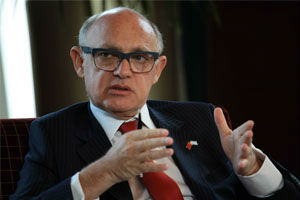Govt mulls measures to deepen reform
Updated: 2013-11-21 01:01
By Li Yang (China Daily)
|
|||||||||||
The government will select some investment projects in the fields of finance, oil, electricity, railways, telecommunications, resource development and public services for private investment, the country's top economic planner has said.
Further details on related policies and measures will be introduced by the end of the year, said the National Development and Reform Commission.
The reform plan sketched out by the just-concluded Third Plenum of the 18th Central Committee of the Communist Party of China prioritizes market economy reforms. The plan said that the market should play "a decisive role" in allocating resources, instead of "a fundamental role" as was the case before.
Xu Shaoshi, head of the NDRC, compared deepening the country's economic reform process with "grabbing the bull by the horns".
"Changing the market's role from 'fundamental' to 'decisive' is a crucial breakthrough and points in the direction of future reform," said Xu. "A market-based resource allocation system, with reasonable government macro control and supervision, is the most efficient model."
One important and urgent task of Xu's commission is to remove various institutional obstacles and controls hindering private investors' access into some cash-hungry sectors.
Except for projects dealing with national, ecological and strategic resource development and others involving key public interests, companies will be able to make investment decisions on their own without the need to apply for government approvals, Xu said.
The government's job will be to maintain market order by enacting effective supervision. It will not interfere with the companies' investments and other market activities, he added.
"Investors should be the main beneficiaries, as well as risk takers, of the investment decisions they make on their own," he said.
"The government should create a good institutional environment for private investment. It will soon clarify where and how private capital can go among some important industries to optimize industrial structures," said Xu.
He said the government will eventually limit its intervention to the public service sector and let the market decide the prices of commodities of services.
"To protect the environment, however, the government will increase the prices of resources and the costs for environmental damage and ecological repair works," Xu said.
The government will also exert its macro-control functions through fiscal and monetary policies, instead of direct administrative intervention, he added.
Xu also said that China will improve its system to evaluate economic performance, placing greater emphasis on the quality of growth to curb local officials' obsession with GDP data.
The country will increase the weight of factors such as consumption of resources, environmental costs, work safety and local debt in assessing local economic growth. It will put more emphasis on employment, residents' incomes, social security and healthcare, he said.
"This is intended to lead local authorities to shift their attention to economic restructuring," he said, adding that the new mechanism will take regional differences into consideration.
In past decades, the promotion of Chinese officials largely hinged on economic performance, which prompted local governments to boost growth by investing in capital- and energy-intensive industries despite the environmental costs. As China tries to bring its economy onto a more sustainable track, central authorities have been at pains to change that.
Earlier this year, President Xi Jinping said the country will not assess the performance of officials simply based on their records of boosting the economy. He promised to adopt more comprehensive criteria.
Related Stories
Reforms may alter local govt operations: Fitch 2013-11-20 15:05
Roadmap for China's future reform 2013-11-20 11:31
Investors eye reform effects 2013-11-20 06:42
China's SOE reforms promising, says pundits 2013-11-19 19:33
Today's Top News
Rupert Murdoch, wife reach divorce deal
Xi seeks greater China-EU cooperation
Spokesmen system expands in army
SCO meeting to focus on anti-terror
Roadmap 'will curb local debts'
Govt mulls measures to reform
Obama's rating drops to all-time low
In Asia-Pacific, HIV still high, report says
Hot Topics
Lunar probe , China growth forecasts, Emission rules get tougher, China seen through 'colored lens', International board,
Editor's Picks

|

|

|

|

|

|





